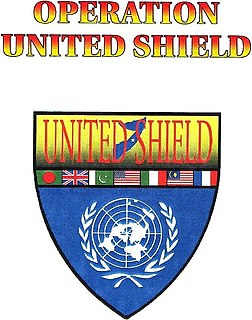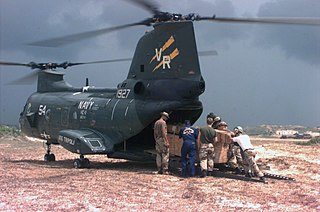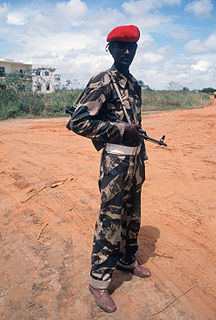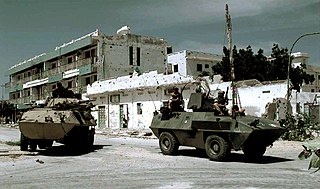
United Nations Operation in Somalia II was the second phase of the United Nations intervention in Somalia and took place from March 1993 until March 1995, following the outbreak of the Somali Civil War in 1991.

Operation United Shield was the codename of a military operation, conducted 9 January to 3 March 1995, bringing a conclusion to the United Nations Operation in Somalia II. Commanded by the United States, two ships of the Pakistan Navy, five ships of the Italian Navy and six ships of the United States Navy formed a Combined Task Force (CTF) ensuring the safe evacuation of all UN Peacekeeping Forces from Somalia.

The Unified Task Force (UNITAF) was a United States-led, United Nations-sanctioned multinational force which operated in Somalia from 5 December 1992 until 4 May 1993. A United States initiative, UNITAF was charged with carrying out United Nations Security Council Resolution 794 to create a protected environment for conducting humanitarian operations in the southern half of the country.
United Nations Operation in Somalia I was the first part of a United Nations (UN) sponsored effort to provide, facilitate, and secure humanitarian relief in Somalia, as well as to monitor the first UN-brokered ceasefire of the Somali Civil War conflict in the early 1990s.

United Nations Security Council resolution 837, adopted unanimously on 6 June 1993, after reaffirming resolutions 733 (1992), 746 (1992), 751 (1992), 767 (1992), 775 (1992), 794 (1992) and 814 (1993), the Council condemned the attacks on the United Nations Operation in Somalia II in which 24 Pakistani troops deployed in the Unified Task Force were killed and 56 injured, including 1 Italian and 3 American soldiers.

United Nations Security Council resolution 819, adopted unanimously on 16 April 1993, after reaffirming resolutions 713 (1991) and all (1992) subsequent resolutions, the Council expressed concern at the actions of Bosnian Serb paramilitary units in towns and villages in eastern Bosnia and Herzegovina, including attacks on civilians, the United Nations Protection Force and disruption to humanitarian aid convoys. The resolution marked the UN's first civilian "safe area" being declared; it failed to prevent the Srebrenica massacre.

United Nations Security Council resolution 751 is a United Nations Security Council resolution adopted unanimously on 24 April 1992, after reaffirming resolutions 733 (1992) and 746 (1992) and considering a report by the Secretary-General Boutros Boutros-Ghali on the ongoing civil war in Somalia. The council established a United Nations Operation in Somalia I with an immediate deployment of 50 observers in the capital Mogadishu to monitor the ceasefire.

United Nations Security Council resolution 733, adopted unanimously on 23 January 1992, after expressing its alarm at the situation in Somalia regarding the heavy loss of life, destruction to property and threat to regional stability, the council, acting under Chapter VII of the United Nations Charter, decided to place a "general and complete" arms embargo on the country for the purposes of establishing peace and stability. The situation was brought to the attention of the security council by the Somali government.

United Nations Security Council resolution 758, adopted unanimously on 8 June 1992, after reaffirming resolutions 713 (1991), 721 (1991), 724 (1991), 727 (1992), 740 (1992) 743 (1992), 749 (1992), 752 (1992) and 757 (1992), the council, in accordance with a report by the Secretary-General Boutros Boutros-Ghali, decided to enlarge the mandate and strength of the United Nations Protection Force (UNPROFOR) in former Yugoslavia.

United Nations Security Council resolution 767, adopted unanimously on 24 July 1992, after reaffirming resolutions 733 (1992), 746 (1992) and 751 (1992), the Council noted the ongoing humanitarian efforts in Somalia by the United Nations and the deteriorating political situation in the country.

United Nations Security Council resolution 775, adopted unanimously on 28 August 1992, after reaffirming resolutions 733 (1992), 746 (1992), 751 (1992) and 767 (1992) considering a report by the Secretary-General Boutros Boutros-Ghali on the ongoing civil war in Somalia, the Council decided to increase the strength of the United Nations Operation in Somalia I by an additional 3,000 personnel.

United Nations Security Council resolution 814, adopted unanimously on 26 March 1993, after reaffirming resolutions 733 (1992), 746 (1992), 751 (1992), 767 (1992), 775 (1992) and 794 (1993) on the ongoing civil war in Somalia, the council, acting under Chapter VII of the United Nations Charter, authorised an extension of the United Nations Operation in Somalia II until 31 October 1993.

United Nations Security Council resolution 865, adopted unanimously on 22 September 1993, after reaffirming resolutions 733 (1992), 746 (1992), 751 (1992), 767 (1992), 775 (1992), 794 (1992), 814 (1993) and 837 (1993), the Council addressed the process of national reconciliation and political settlement in Somalia, during the civil war.

United Nations Security Council resolution 878, adopted unanimously on 29 October 1993, after reaffirming resolutions 733 (1992), 746 (1992), 751 (1992), 767 (1992), 775 (1992), 794 (1992), 814 (1993), 837 (1993) and 865 (1993) on Somalia, the Council expressed its commitment to a future concerted strategy for the United Nations Operation in Somalia II and extended its mandate for an interim period until 18 November 1993.

United Nations Security Council resolution 885, adopted unanimously on 16 November 1993, after reaffirming resolutions 733 (1992), 746 (1992), 751 (1992), 767 (1992), 775 (1992), 794 (1992), 814 (1993), 837 (1993), 865 (1993) and 878 (1993) on Somalia and Resolution 868 (1993) on the safety of United Nations peacekeeping personnel, the council authorised the establishment of a Commission of Inquiry to investigate attacks on the United Nations Operation in Somalia II which led to casualties.

United Nations Security Council resolution 886, adopted unanimously on 18 November 1993, after reaffirming resolutions 733 (1992) and all of its subsequent resolutions on Somalia, the council discussed the situation in the country and renewed the mandate of the United Nations Operation in Somalia II until 31 May 1994.

United Nations Security Council resolution 897, adopted unanimously on 4 February 1994, after reaffirming resolutions 733 (1992) and 886 (1992) and all of its subsequent resolutions on Somalia, the Council discussed the role of the United Nations Operation in Somalia II in the peace process in the country.

United Nations Security Council resolution 929, adopted on 22 June 1994, after recalling all resolutions on Rwanda, including 912 (1994), 918 (1994) and 925 (1994), the council authorised, under Chapter VII of the United Nations Charter, the temporary establishment of a multinational operation in the country to assist in humanitarian efforts and protect refugees and displaced people, until the full deployment of the expanded United Nations Assistance Mission for Rwanda (UNAMIR).

United Nations Security Council resolution 954, adopted unanimously on 4 November 1994, after recalling Resolution 733 (1992) and all relevant resolutions on the situation in Somalia and a recent security council mission to the country, the Council noted the lack of progress in the peace process and decided, under Chapter VII of the United Nations Charter, to extend the mandate of the United Nations Operation in Somalia II for a final time, until 31 March 1995.
United Nations Security Council Resolution 1725, adopted unanimously on December 6, 2006, after recalling previous resolutions on the situation in Somalia, particularly resolutions 733 (1992), 1356 (2001) and 1425 (2002), the Council authorised the Intergovernmental Authority on Development (IGAD) and African Union to establish a protection and training mission in the country.


















